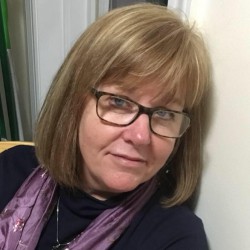Massachusetts teacher develops archaeology elective using Corinth Excavations K-12 educational resources

Nancy Antoneliis, MEd
Corinth Excavations has been developing innovative K-12 educational resources since 2014 thanks to generous grants from the Steinmetz Family Foundation. With ten lesson plans completed and featured on Skype in the Classroom and the Microsoft Educator Community, Corinth Excavations has fostered connections with international teachers to deliver educational resources directly from an active archaeological excavation, a first-of-its-kind endeavor in Greece (and perhaps worldwide) which enables students from around the world to share in the rich culture and legacy of ancient Greece.
Recently, the American School of Classical Studies at Athens (ASCSA) reached out to ASCSA alumna and high school teacher Nancy Antonellis, MEd, to learn how she has shared the work of Corinth Excavations with the students of Brockton High.
Greek Archaeology: Introducing real archaeology at the high school level
Nancy Antonellis, MEd
As a Latin and Classical Humanities teacher, I have often lamented the lack of time during the academic semester to provide students with a broader exposure to the ancient world beyond the confines of the city of Rome.
In 2016, I began collaborating at Corinth Excavations for their archaeological outreach. I saw potential not only to imbed artifacts into my Latin lessons, but also the Corinth Excavations lesson plans had wide appeal. Serendipitously, I returned to my high school in Brockton, Massachusetts, to a unique opportunity never before offered during my tenure: to propose an elective course of my choosing. This was my chance to create an interdisciplinary and experiential approach instructing students about the ancient world.
The elective met swift approval, and the interest of administration, faculty, and students was piqued, resulting in the course being fully enrolled for two sections each semester.
My Greek Archaeology course proposal was to first introduce the students to how we know what we know about the ancient world. They would discover what archaeology is and how it is conducted, the skill sets of specialists required to “read” varying artifacts from an excavation, interpret what artifacts can tell us, and focus on Corinth as my example throughout this process. The goals of my elective were ambitious and, following the introduction, the depth of the lessons available at Corinth Excavations provided a rich resource. Students demonstrated an understanding of how literature, material culture, and subsequent analysis dovetails into an understanding of life over two thousand years ago.
This academic year marked four semesters and various iterations of my archaeology course at Brockton High School. During this time, I have used many of the lessons from Corinth Excavations, but the most memorable lesson for me (and confirmed by student evaluations) was “Asklepios and Healing in the Ancient Greek World and Today”. This lesson was the highlight of each semester due to its experiential learning extension.
In this lesson, students compare ancient and modern healing practices. Working with primary sources and visual aids, students studied the history of a familiar yet often misrepresented medical symbol, the Rod of Asklepios, and the purpose of votives in connection with ancient healing practice. The experiential extension provided students with the opportunity to create a personal votive from clay. When the ceramics studio was available, students fired their votives in kilns; when unavailable, self-hardening clay was equally effective. An unexpected outcome of the experiential component was the informal discussions among students during this activity, ranging from reflections on realities of ancient daily life to their experiences accessing modern medicine. Each delivery of “Asklepios and Healing in the Ancient Greek World and Today” informed the next, refining the rich content in this lesson plan.
Observing the non-Latin language students who had little background in the ancient world has been the most fulfilling aspect of my Greek Archaeology elective. World History classes suffer the same time constraints as Latin classes, so any lesson plan that supplements and enriches content across curricula, like the Corinth Excavations lessons, adds immense value to student learning. Having ready-made lessons complete with literary and visual resources provide teachers the ability to easily adapt them for their specific students. I see these lessons as especially beneficial in World History, Latin, or special elective courses.
Many evaluations confirmed that my students found the lessons engaging because they realized that archaeology at Corinth continues to reveal answers about the ancient world in a tangible way. Students also reflected that they knew abstractly about archaeology, but now realize that this type of inquiry is ongoing and always contributing to our understanding of history, Corinth in particular.
As the K-12 educational resources at Corinth Excavations continue to grow and diversify, l look forward to my students participating in the Skype and online program offerings where they have an opportunity to interact live with an expert at Corinth Excavations. The outreach initiative here is an exciting addition to my courses, as will be the Latin language lesson plan I am currently developing using inscriptions found in Corinth. It is a privilege to collaborate on these lessons with Katie Petrole, Steinmetz Family Foundation Fellow, and Ioulia Tzonou-Herbst, Associate Director of Corinth Excavations.
Latin and Classical Humanities teachers-- stay tuned for an upcoming lesson on Latin inscriptions. Until then, you can find me reading the Latin monographs in the Corinth Excavations workroom.
Valete,
Nancy Antonellis
Nancy Antonellis is a Latin and Classical Humanities teacher at Brockton High School. In 2017, she won the Rea Silvia Borza Scholarship to participate in the ASCSA Myth On Site Summer Seminar. She has contributed countless hours volunteering at Corinth Excavations to research, brainstorm, and edit Corinth Excavations K-12 educational resources alongside Corinth’s Steinmetz Family Foundation Museum Fellow, Katie Petrole.